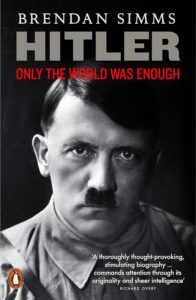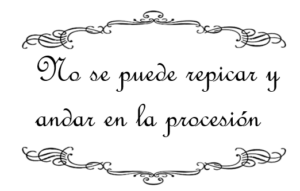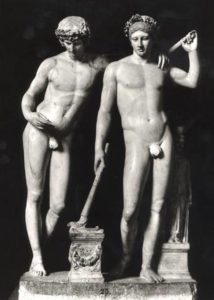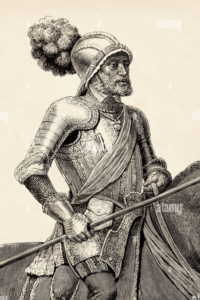by Eduardo Velasco, 2

Pedrito said:
You are a case of supreme intellectual perversion. They should hire you at Libertad Digital or COPE.
NT (Velasco) replied:
Oh, yes, my dear Pedrito-ito-ito, I am a pervert, a very perverse pervert, and even the Antichrist himself would do well to hire me and have me at his side when the time comes. Cuchi cuchi cuchi cuchi, the pervert is coming to tease you!
If you have no sense of spelling, at least you have a sense of humour… very flat, that’s for sure.
Okay.
And now fuck off from my blog to the Paris metro at 3 am to preach how much you like the good vibes of the multi-culti movement.
Your failed, lapsed, ageing, wrinkled, atrophied and malfunctioning generation has uneventfully ended its insipid, grey and pathetic reign, OK? So face it. You have no ability to influence or participate in an issue or have art or part.
The future world belongs to the young, and I’m sorry to tell you that the young don’t give a shit about your pacifist, hippiesque, sedative rubbish. We care about other, nobler things (like, for example, ourselves).
Modern youth have much higher goals than your leftist bubble. Like, for example, fucking, partying, getting drunk, getting high, fighting, making money, buying stuff, sinking into the most hedonistic material joy and living comfortably.
No kidding, those petty and abject aspirations are much loftier and more logical goals than the pathetic, tiny, anaemic motives of the modern 30-50-year-old bourgeois, and they constitute a positive change.
We have made some progress, yes. Now real physical drives, based on biology and base instincts, have taken the place of an abstract entelechy preached by four half-witted Jews. The next step is higher instincts.
Progre-shitheads = Bruaaaaaaaaargh (retching, cramping and, finally, vomiting). Go to your graves, poor shadows of yourselves.
Pedrin said:
Let me get this straight. You have an emotional schizophrenia that perverts your thinking. And your skill for rhetoric and sophistry (clearly visible to the eyes of those who read you) makes you even more gone.
Ok, I agree with you that the recycled bourgeoisie (read progressives) is trash. But your hatred of it makes you only think with your left (look at you, left) brain hemisphere.
NT replied:
Schizophrenia is not telling truths like American fists, but (for example) calling each other Pedrin by day and Natasha by night. Stop with the ad hominem attacks and concentrate on arguments like in the biological quality post.
You’re not a progressive, good for you.
My advice to you is to wander through my blog without renouncing to wave your flag of morbidity, breathing deeply and inhaling the perverse vapours emanating from my perverse schizophrenia emanating from my left hemisphere. After Nietzsche and Jung, my blog may become the cornerstone of your irreversible Nazification.
Pedrin said:
[Long comment quoted below by Velasco:]
NT replied:
Look at Daoism (Taoism) and Confucianism. Ethos and pathos. Pure dualistic thinking, and therefore false and shallow.
You lightly dismiss two extremely ancient and profound doctrines. Taoism is, so to speak, a jewel. No philosophy has reached even a fraction of its knowledge of the human body, its hidden springs and techniques of inner alchemy (Hinduism and Buddhism are comparable). Dualism is not synonymous with simplicity. There are dualisms of conciliation or separation, and there are interesting examples in both cases. Manichaeism is 100% dualistic and yet I consider it to be extremely profound and complete.
All the vigorous macho men I’ve known were at heart pussies on the psychological level.
I get the feeling that’s what the weak in character and body try to tell themselves to overcome the trauma of not being that way. So ‘deep down’ they were pussies. Did you explore the cerebral cortex of each of them to come to that conclusion, or were you perhaps guided by prejudice? Did you slap each of them on the ass to see if they would let out a ‘ha-ha’? Was Achilles a pussy? Leonidas? El Cid? So what are you proposing? That instead of vigorous macho men we should be weak damsels? What’s wrong with being a vigorous macho man? Is it better to be like a Zerolo? What would Nietzsche or Jung think of Zerolo? Hmm, I’m intrigued, pal…
Violence for violence’s sake is an armour.
Yeah, tell that to Attila, Genghis Khan or Tamerlane, and see what they say.
First of all, the most insecure children are precisely those who have felt little maternal warmth. It is indispensable in the first years of life.
I never said otherwise, read well. The maternal-filial bond materialised in the cord and breastfeeding is important in the first years of life. But at a certain age, the child must be emancipated from that influence. In societies as far apart as Sparta and the chivalric orders of the Middle Ages, that age was 7.
In patriarchal society, the consummation of this symbiosis is prevented, the mother-child dyad is ripped away to create mindless warriors.
At 7, the symbiosis is more than complete, and a prolongation of it would produce a spoiled and capricious child. On the other hand, if Leonidas is a ‘brainless warrior’, well… we need more ‘brainless warriors’!
Don’t confuse matriarchy with matristics. There have never been matriarchies (where women rule), that is an anthropological aberration. There have been matristic societies, which is different.
Anthropological aberration? Male chauvinist! We’re all equal and blah blah blah. Just kidding. We use different terms. I call gynecocracy what you call matriarchy, and I call matriarchy what you call matristic.
It is in patriarchy that women rule in the pussy that hides behind the warrior, and where the manipulative woman appears.
Examples? Bullshit, this archetype of the manipulative woman appears in matriarchies, in pseudo-patriarchies (Jews, Gypsies, Islam) or in already decadent patriarchal societies (Sparta, Rome). See the case of the Roman Poppea Sabina, or in the Sultanate of Women during a certain phase of the Ottoman Empire.
Very documented and flowery everything you say, but they are falsehoods, contradictions, and shallow thinking.
The good thing about having an opinion is that it’s free. Or as ZP would say, ‘I’m glad we disagree, that’s the greatness of democracy, ñaña’.
But I don’t believe in democracy. You think you’re right, I think I’m right and, in the end, only one of us is right.
(Needless to say, that one is me, and the other is you: the one who is barking, braying and yapping.)
Pedrin said:
[…] [Omitted by Ed.] And I would like to know what is a ‘pure’ patriarchal society and what is the ‘pure’ race for you, and from this I can criticise it. I know what the Aryan race is, but where is the purity of the Aryan race? It seems to me that as Plato was looking for the highest good, you are also looking for an ideal that does not exist. What is a pure Aryan? I don’t quite understand.
NT replied:
If you think that aggressiveness is only for defending yourself, fighting for females, food or territory, you don’t know yourself. Aggressiveness and violence are perfectly healthy and perfectly natural, and a man who doesn’t have them is a sick disgusting creep.
If you want to know what a pure patriarchal society is, read this post.
If you want to know what the Aryan Race is… you’ve gone to probably the only place in Spanish where this is explained understandably, so I don’t know why you’re not wandering around the blog (particularly in the ‘Nordicism’ topic) or scratching your head.
An Argentinian said:
Nordic: if you are as manly, violent and phallic as you say; if you would like to clash swords against the flesh of others and taste the blood of the defeated; if you would like to be led in a political direction by kicking the boots of uniformed men in the ass… Why don’t you go live in Cuba?
If you are so handsome, post a picture of yourself so that your schoolmates and your parents (who probably don’t know that you have this idiocy in your head) know about the reading you resort to for recreation. We are in the 21st century, and we have to have a more critical vision than those who came before us. Get rid of your prejudices and find your true voice. Don’t be left with the first impression of power or violence. Underneath the mask is the true face of control and aggression.
NT responded:
Please point me to the exact spot where I say I am ‘violent and phallic’ and that I want to taste the blood of my enemies (you’re out of your mind pal, ha ha) or all the nonsense you just said.
So think before you write, you oaf.
And what schoolmates? I haven’t been to school for a long time, and when I was in high school, I was a skinhead and my whole fucking town knew I was a Nazi, besides my parents.
Yes, this is the 21st century, the century of the cowardly, mechanical, ant-like, unnatural, degenerate and ungodly man. You understand I look back to times when life was pure, man almost perfect and justice simple.
You are invited to read this blog. You, a Judeo-Christian morbidly curious about Nazism, you repressed Argentine Nazi. 🙂
 Hitler flanked this rhetoric with a carefully calibrated propagandistic effort. He gave a speech at Bayreuth—Wagner’s city—in mid September 1923, and returned about a fortnight later to speak again. On that occasion, taking up the invitation of Winifred Wagner, the Englishborn wife of Wagner’s son Siegfried, he went to the Wagner shrine at Wahnfried. There Hitler spoke to the composer’s son-in-law, the racist political philosopher Houston Stewart Chamberlain, author of the best-selling Foundations of the Nineteenth Century, upon whom he made a very favourable impression. Hitler paid homage at Wagner’s grave. He also published an autobiographical text and a selection of his speeches under the title of Adolf Hitler: His Life and His Speeches. The name on the front page was that of his associate Victor von Koerber, but the real author was Hitler. He rehearsed his political positions, including his attacks on ‘Bolshevism’ and ‘international Jewish mammonism’, but pointedly deleted all negative references to the United States, most likely in order to encourage US toleration of a successful coup. The principal purpose of the book was to cast Hitler as the saviour of Germany. Koerber-Hitler spoke of him no longer as a ‘drummer’ but as ‘an architect who is building the mighty German cathedral’. No doubt drawing on his overtures to Bavarian Catholics, Hitler had himself styled as a messianic figure, whose political awakening was compared to the resurrection of Christ, and whose writings were a kind of holy writ.
Hitler flanked this rhetoric with a carefully calibrated propagandistic effort. He gave a speech at Bayreuth—Wagner’s city—in mid September 1923, and returned about a fortnight later to speak again. On that occasion, taking up the invitation of Winifred Wagner, the Englishborn wife of Wagner’s son Siegfried, he went to the Wagner shrine at Wahnfried. There Hitler spoke to the composer’s son-in-law, the racist political philosopher Houston Stewart Chamberlain, author of the best-selling Foundations of the Nineteenth Century, upon whom he made a very favourable impression. Hitler paid homage at Wagner’s grave. He also published an autobiographical text and a selection of his speeches under the title of Adolf Hitler: His Life and His Speeches. The name on the front page was that of his associate Victor von Koerber, but the real author was Hitler. He rehearsed his political positions, including his attacks on ‘Bolshevism’ and ‘international Jewish mammonism’, but pointedly deleted all negative references to the United States, most likely in order to encourage US toleration of a successful coup. The principal purpose of the book was to cast Hitler as the saviour of Germany. Koerber-Hitler spoke of him no longer as a ‘drummer’ but as ‘an architect who is building the mighty German cathedral’. No doubt drawing on his overtures to Bavarian Catholics, Hitler had himself styled as a messianic figure, whose political awakening was compared to the resurrection of Christ, and whose writings were a kind of holy writ.






